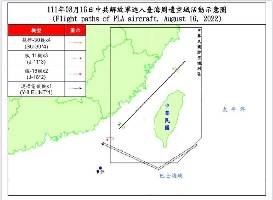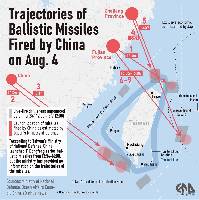
Taiwan braces for sustained Chinese pressure
ROC Central News Agency
08/17/2022 03:44 PM
By Teng Pei-ju and William Yen, CNA staff reporters
With Beijing expected to continue flexing its muscles ahead of the Chinese Communist Party's (CCP) national congress in the autumn, and expert anxieties over the risk of a cross-Taiwan Strait military crisis, the public mood in Taiwan is mixed.
Three polls released over the past two weeks -- by the Taiwanese Public Opinion Foundation, Chinese Association of Public Opinion Research and online media Convergence Media (CNEWS) -- showed that 60-78 percent of respondents in Taiwan were not worried about large-scale live-fire military drills launched by Beijing in the wake of U.S. House of Representatives Speaker Nancy Pelosi's visit to Taipei on Aug. 2-3.
"Their actions are the same bluffing and hoaxes as usual," is the view of Hsu Chiung-chou, a 29-year-old Taipei-based content producer.
The encirclement of Taiwan and the launching of missiles over Taipei -- a "simulated attack" in the words of the Ministry of National Defense (MND) -- has been met with a shrug by many in a country wearily attuned to Chinese saber-rattling.
"I think the biggest concern of my friends, are, like how to book a restaurant these days. So, that's the Taiwanese attitude towards these (military) exercises," Wu'er Kaixi (吾爾開希), former Tiananmen student leader and now secretary general of the Taiwan Parliamentary Human Rights Commission, told CNA.
According to Hung Chin-fu (洪敬富), chairman of the Department of Political Science of National Cheng Kung University, domestic political considerations and not preparation for an invasion were the driving force behind China's recent actions.
Military drills and the publication of a white paper reasserting claims over Taiwan as part of the "one China" principle are designed to convince nationalists and military hawks that Chinese leader Xi Jinping (習近平) will not make concessions over Taiwan, Hung told CNA.
Chieh Chung (揭仲), a research fellow at the Association of Strategic Foresight, said that China's military could aim to "keep up" tensions until after Xi secures the approval for an unprecedented third term at the CCP's upcoming national congress.
Median line
Yet there is some concern that the breaching of the Taiwan Strait median line could inadvertently spark a wider conflict.
The line, an unofficial border previously recognized by both Taipei and Beijing, is said by the MND to have been crossed 225 times so far by Chinese warplanes in August.
Every time a Chinese warplane crosses the line, Taiwan's military must scramble interceptor jets -- something that increases the risk of collisions and other accidents, Chieh said.
Fears that the line becomes a flashpoint are also present on the streets of Taipei.
Chen (陳), a retiree, told CNA that talks of an attack had become a common family discussion. "I think we have to be wary and find ways to stop the Chinese military from crossing the median line in the Taiwan Strait."
Negotiating with Washington to acquire more aircraft and naval vessels could help to ensure that any standoff in the Taiwan Strait does not escalate into a shootout, according to Chieh.
"We cannot fire a missile at a Chinese warplane that crosses the median line. All we can do is to find a way to repel it -- and that sort of task requires a plane or a naval vessel," Chieh said.
Chen Shih-min (陳世民), an associate professor at National Taiwan University's (NTU) Department of Political Science, said that recent developments mean the government should place more emphasis on deterrence over defense.
He said defending against an attack is only going to become increasingly unrealistic as China's military capabilities continue to grow.

A Ministry of National Defense graphic shows that seven Chinese aircraft crossed the median line of the Taiwan Strait on Aug. 16. (Image taken from mnd.gov.tw)
The United States looms large
Chen Shih-min said that China's military posturing could prompt the U.S. to take more action in support of Taipei.
The U.S. Congress could end up pushing through the proposed Taiwan Policy Act, which seeks to overhaul Washington's policy toward Taipei and designate the island as a major non-NATO ally of the United States, he said.
The deliberation of the bill at the Senate Foreign Relations Committee has reportedly been postponed to September amid pushback from the White House.
Nevertheless, Chen Shih-min argues that congressmen from both parties might back the bill to show they are "taking a tougher line" on China, despite "hesitancy" by U.S. President Joe Biden's administration.
For some, however, Washington has already done enough.
"At times I feel Taiwan is a chess piece that is being used by the U.S. for its own political interests," Hsu Chia-yi, a 40-year-old Taipei resident working in marketing, told CNA.
"Pyrrhic Victory"
Even if Taiwan, with the help of the U.S., successfully defends against a Chinese invasion, it will be a "pyrrhic victory" for the island given the devastating and irreversible economic losses that will occur, Chen Shih-min said, citing the results of a recent war game funded by the Washington-based think tank, the Center for Strategic and International Studies.
"If they [China] really do attack us, there isn't much we can do," said a 30-something-year-old hospitality worker from New Taipei, surnamed Wu (吳).
In the meantime, people in Taiwan continue to lead their lives as normal. Shares in the country soared by more than 300 points on Aug. 5, the day after the missile launches.
Yet economic normality could be the next target in Beijing's crosshairs, according to Lin Ya-ling (林雅玲), an associate research fellow at the government-funded Institute for National Defense and Security Research.
Noting that Beijing has already halted natural sand exports to Taiwan and suspended the import of certain agricultural and food products from the island, Lin said Beijing could place similar restrictions on more Taiwanese products or services from the "early harvest list" of the Economic Cooperation Framework Agreement (ECFA).
In June, groupers from Taiwan became the first product from the 500-item list to be banned from entering China.
Taiwanese exporters must now take into consideration political risks when selling goods to China, Lin said.
Enditem/ASG
|
NEWSLETTER
|
| Join the GlobalSecurity.org mailing list |
|
|
|


